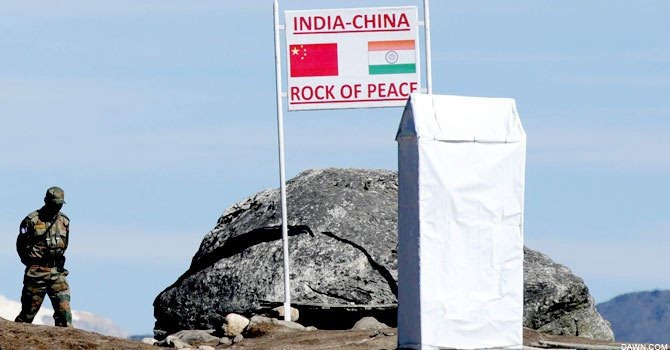India China Border Talks To Resume
Talks resume today

NEW DELHI: India and China are set to resume the 18th round of talks on the contentious border dispute. This will be the first such discussion since Prime Minister Narendra Modi came to power.
China's special representative Yang Jiechi will meet with National Security Adviser Ajit Doval on Monday, as India and China seek to improve ties ahead of PM Modi’s visit to Beijing in May.
Chinese Ambassador to India Le Yucheng described the talks as a “new start.” “We are looking forward to continuity of spirit and atmosphere we have from previous talks. Both sides will express our vision on how to find a way out of this dilemma,” Le was quoted by the Headlines Today network as saying.
The two countries share an ill-defined 4,057km (2,520 miles) border that has complicated relations. In fact, border tensions overshadowed a high profile visit of Chinese President Xi Jinping to India in September 2014, for talks with PM Modi. As hundreds of Chinese soldiers moved into Indian territory in Ladakh, bilateral relations between the two countries dipped and India raised “serious concerns” about the transgressions. “Clarification of the Line of Actual Control would greatly contribute to our efforts to maintain peace and tranquillity and I requested President Xi to resume the stalled process of clarifying the LAC,” PM Modi had said at the time.
More recently, last month, China objected to PM Modi’s visit to Arunachal Pradesh, saying that it could add fuel" to the territorial dispute. Chinese Vice Foreign Minister Liu Zhenmin summoned Indian Ambassador Ashok Kantha to say that PM Modi's visit "infringes on China's territorial sovereignty and interests, magnifies the dispute on the border issue and violates the consensus on appropriately handling the border issue."
Arunachal Pradesh is a bone of contention between the two countries, with China maintaining that the border dispute is confined to the area, whereas India claims that China occupies 38,000 square km (14,600 sq miles) of its territory on the Aksai Chin plateau in the west.
The dispute led to the 1962 Sino-Indian War, and has characterised relations between the two countries ever since.
However, the two countries seem to be ready to work toward mending ties, with the talks on the border dispute and PM Modi’s visit following a visit by External Affairs Minister Sushma Swaraj to Beijing early February. “China today is our largest partner in trade and goods. The two countries are moving to invest in each other. Serious discussions enhancing connectivity has been initiated. On that foundation we are now seeking to take our economic cooperation to a qualitatively new level,” Swaraj had said.
The talks also follow the sixth round of Working Mechanism for Consultation and Coordination on India-China Border Affairs in Beijing, which concluded on 30 April last year. The Indian delegation was led by Shri Gautam Bambawale, Joint Secretary (East Asia) and comprised of representatives of the Ministries of External Affairs, Defence and Home Affairs as well as members of the Indian Army and Indo-Tibetan Border Police. The Chinese delegation was led by Mr. Ouyang Yujing, Director General, Department of Boundary and Oceanic Affairs, Ministry of Foreign Affairs and comprised of representatives of the Ministries of Foreign Affairs and National Defence. The Indian delegation called on Mr. Liu Zhenmin, Vice Minister of Foreign Affairs.
At the time, the Ministry of External Affairs issued a statement saying that the talks were “held in a cordial, constructive and forward looking manner at a time when the season is changing in the high altitude areas along the India- China border. Both sides agreed that maintenance of peace and tranquility on the border was an important guarantor for the further development of bilateral relations. The talks reviewed recent developments particularly in the Western Sector of the boundary, implementation of the Border Defence Cooperation Agreement and additional confidence building measures. An alternate route for the Kailash-Manasarovar Yatra was explored.”



